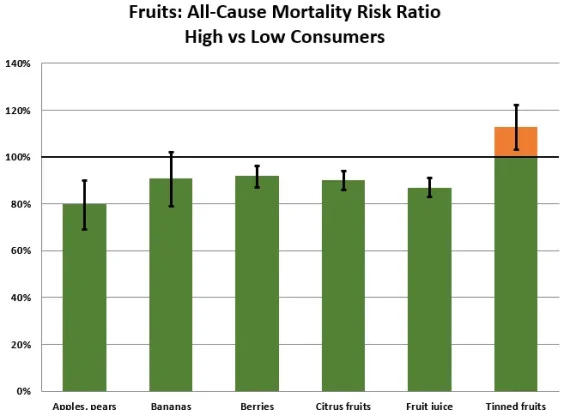Benefits of Fruits and Vegetables: Equality of Plant Life
Superfoods! Loaded with anti-oxidants! Put lots of color on your plate. Green, leafy veggies are the most important.
There's a lot of opinions about which vegetables and fruits are the healthiest. When building a nutritious diet, it's worthwhile to look if fruits or vegetables outperform the others in extending life, so I searched through the references from studies on all-cause mortality and checked for more recent studies to see if there were any other studies better or worse vegetables or fruits.
Here's the answer for vegetables1:
The summary is: it's all good. Only potatoes show a statistically significant benefit greater than the other vegetables. I suspect that's not because potatoes are better than the other vegetables, but because the high intake of potatoes was more (over 100g). The critical study from 1984 is older than others. Note that cruciferous vegetables (broccoli, kale, cauliflower stuff) weren't better than other veggies, and green leafy vegetables also didn't get any particular points over other vegetables. In fact, in that same study in the supplemental material, they did a spline curve on the benefit from leafy vegetables. They found that after 50 grams, there's no additional benefit from eating more for longevity.
Most fruits also show about the same amount of benefits, except apples and pears being slightly better for longevity. Since a large apple is nearly 250 grams, an apple a day does help keep the doctor away. There is one clear outlier for fruits, though--tinned or canned fruits. Eating tinned fruits *increases* your chance of dying by about as much eating regular fruits decreases it. Not sure why this would be. Chemicals used in the canning process? In any case, better to avoid tinned fruits.
The bottom line is that there isn't a particular fruit or vegetable that is significantly better than the others. Focus on getting 300 grams of vegetables and 250 grams of fruit per day, eating whichever you like.
FAQs
Q: What are the health benefits of eating fruits and vegetables?
A: Consuming vegetables and fruits offers numerous health benefits. They are rich in essential vitamins, minerals, and dietary fiber, which contribute to overall well-being. They help maintain good sugar levels2 and reduce the risk of cancer and heart disease 3.
Q: Are green leafy vegetables more important for a nutritious diet compared to other vegetables?
A: While green leafy vegetables, such as spinach and kale, are packed with nutrients and offer numerous health benefits, all vegetables play a vital role in a nutritious diet. It's important to have a varied intake of vegetables to ensure you receive a wide range of nutrients.
Q: Do potatoes have a greater benefit for extending life compared to other vegetables?
A: The studies indicate4 that potatoes show a statistically significant benefit when it comes to extending life. However, it's important to note that this may be due to higher consumption levels rather than potatoes being inherently superior to other vegetables. To reap the health benefits of fruits and vegetables aim for a diverse range of them.
Q: Are green leafy vegetables beneficial for longevity, or is there a limit to the benefits after a certain intake?
A: Green leafy vegetables are indeed beneficial for longevity due to their rich nutrient profile. However, the studies suggest that there may be a point of diminishing returns after a certain intake, typically around 50 grams. Therefore, while green leafy vegetables are nutritious, it may not necessarily be more beneficial to consume large quantities beyond a certain threshold.
Q: Which fruits are slightly better for longevity compared to others?
A: Among fruits, apples and pears were found to have a slightly better association with longevity. Including these fruits in your diet can contribute to overall health and well-being. Health benefits of fruits and vegetables are a lot for longevity, making them essential.
Q: Does eating an apple a day truly have health benefits?
A: Studies showed5 that incorporating an apple into your daily diet can have health benefits. Apples are rich in fiber, vitamins, which can support heart health, improve digestion, and help in regulating blood sugar levels.
Q: Why do tinned or canned fruits increase the risk of mortality?
A: The studies revealed6 that consuming tinned or canned fruits is associated with an increased risk of mortality. It is speculated that the canning process may involve additives, preservatives, or higher sugar content that could have negative effects on health. It is generally advisable to opt for fresh or frozen fruits instead.
Q: What is the significance of consuming a variety of colorful fruits and vegetables in a balanced diet?
A: Consuming a variety of colorful fruits and vegetables ensures a diverse range of nutrients, vitamins, and minerals in your diet. Different colors in fruits and vegetables indicate the presence of various beneficial compounds, each with its unique health-promoting properties. You can increase the health benefits of fruits and vegetables by including a rainbow of colors on your plate.
Q: How do vegetables and fruits contribute to maintaining a healthy weight?
A: Vegetables and fruits are low in calories and high in fiber, which aids in weight management. The high fiber content helps you feel full for longer, reducing the chances of overeating. Additionally, their water content helps to hydrate the body without adding excessive calories, making them a valuable part of a balanced diet for weight maintenance.
Q: Which specific nutrients and vitamins can be found in vegetables and fruits?
A: Vegetables and fruits are rich in a variety of nutrients and vitamins. They typically contain vitamins A, C, and K, as well as folate, potassium, and dietary fiber. Leafy greens such as spinach and kale are excellent sources of iron and calcium, while citrus fruits provide a significant amount of vitamin C. These nutrients and vitamins ensure health benefits of fruits and vegetables for people of all ages.



